Google Paid Inclusion Programs: Buy a Top Ranking Today
Google announced they were going to extend their vertical paid inclusion program to product search queries, where the paid inclusion results are put inline with the organic search results, often driving most (if not all) of the organic search results below the fold.
The layout of the result looks something like this
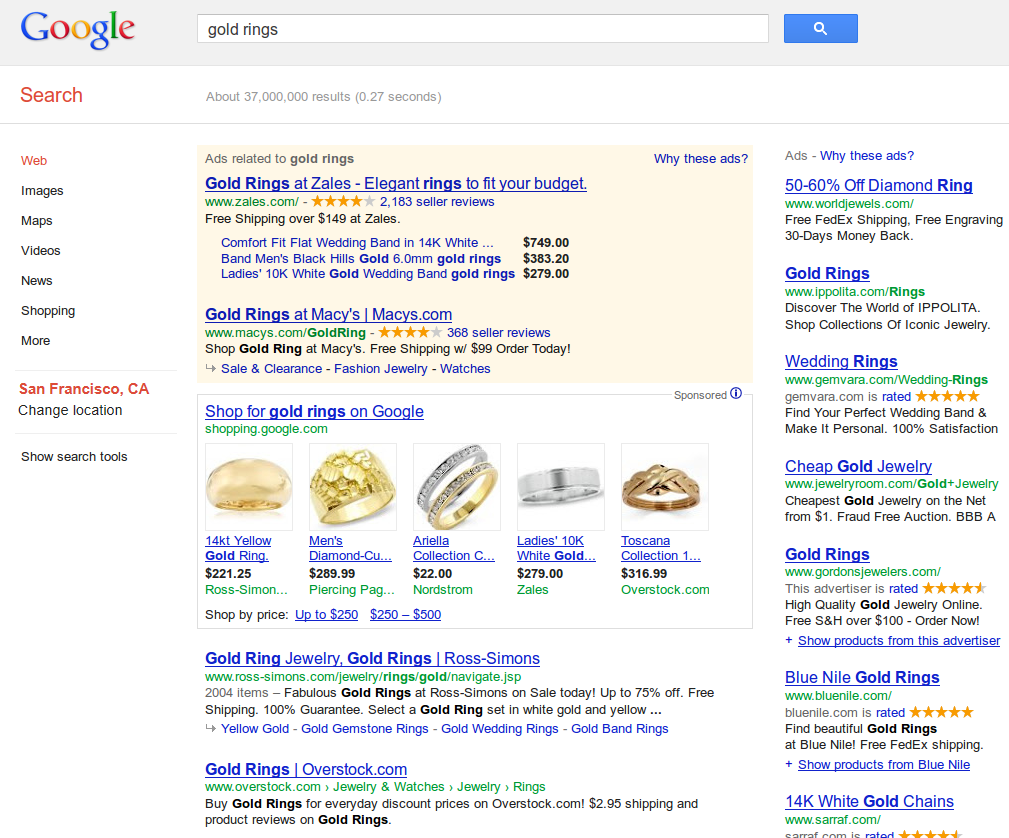
Or if you put it in Google's browser analysis tool, it looks something like this
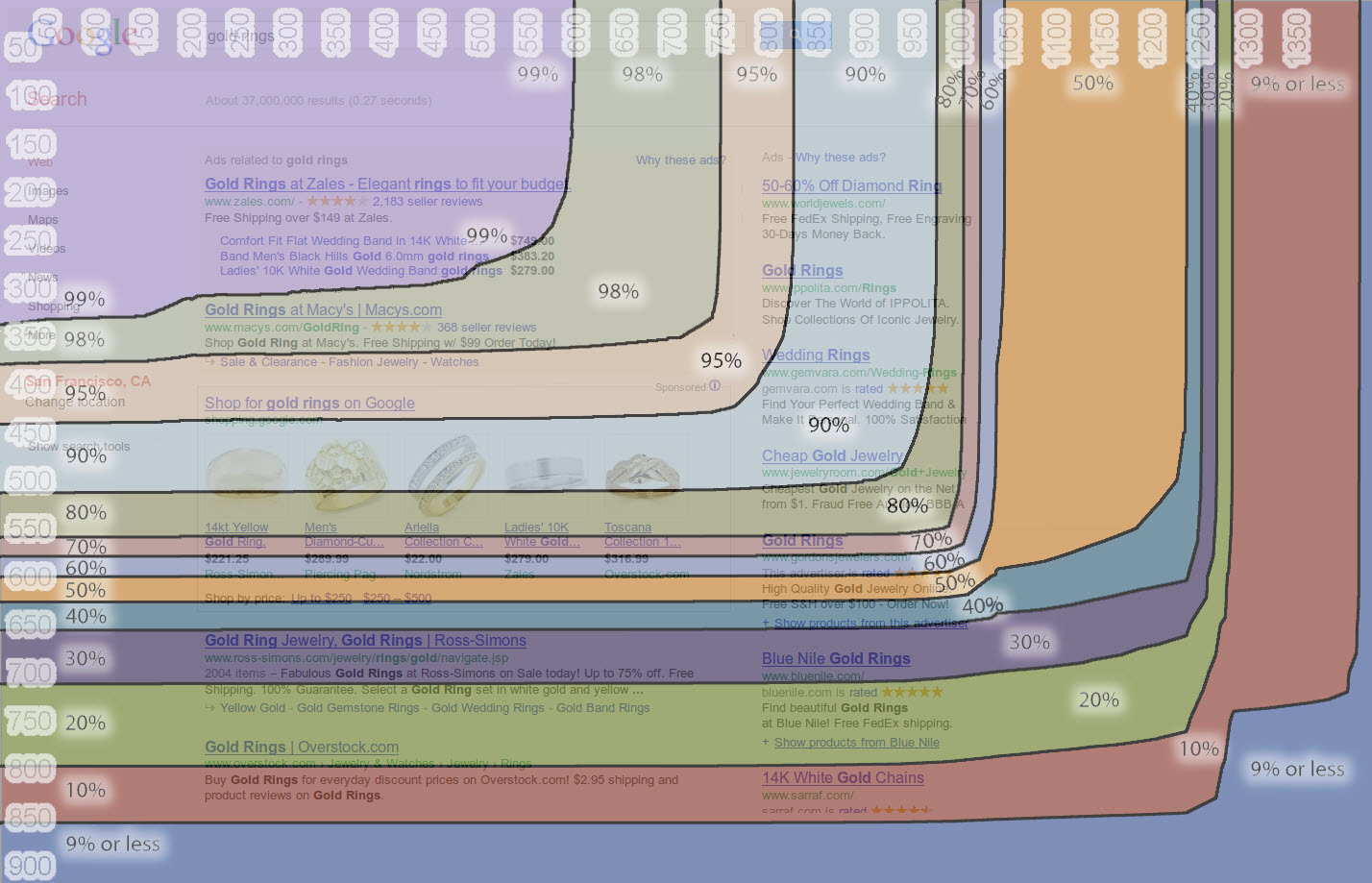
And with that move, if you are in ecommerce & you don't rank #1 you are essentially invisible to most searchers.
As John Andrews highlighted on Twitter: "Notice Google tells us "paid relationships improve quality" and then penalizes for paid links?"
As always, it is more profitable to follow Google's biz dev team than Google's public relations pablum.
In some cases Google might include 3 or 4 different types of monetization in a search result. In the below search result Google includes:
- AdWords ads
- Google Offers
- Hotel Comparison ads
- Hotel Price ads
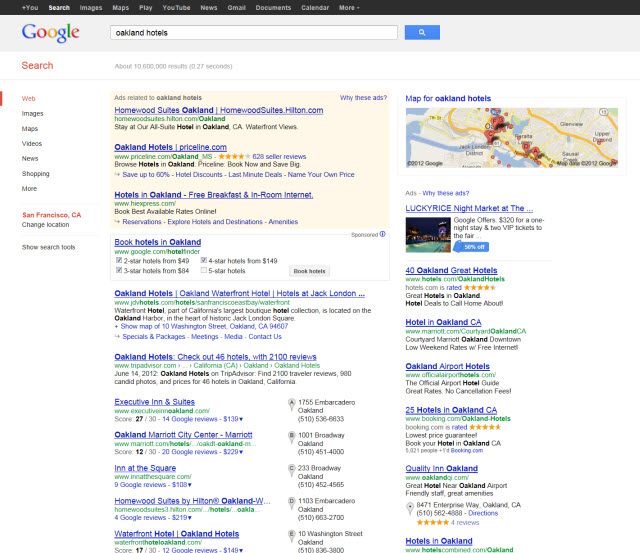
And those are *in addition* to featuring promotional links to Google Maps & Google+ in the search results. Further, some of these vertical results consist exclusively of paid inclusion & then have yet another layer of PPC ads over the top.
As SEOs we focus a lot of energy on "how do I rank 1 spot higher" but when the organic results are displaced and appear below the fold why bother? The issue of the incredibly shrinking organic result set is something that can't be over-emphasized. For many SEOs the trend will absolutely be career ending.
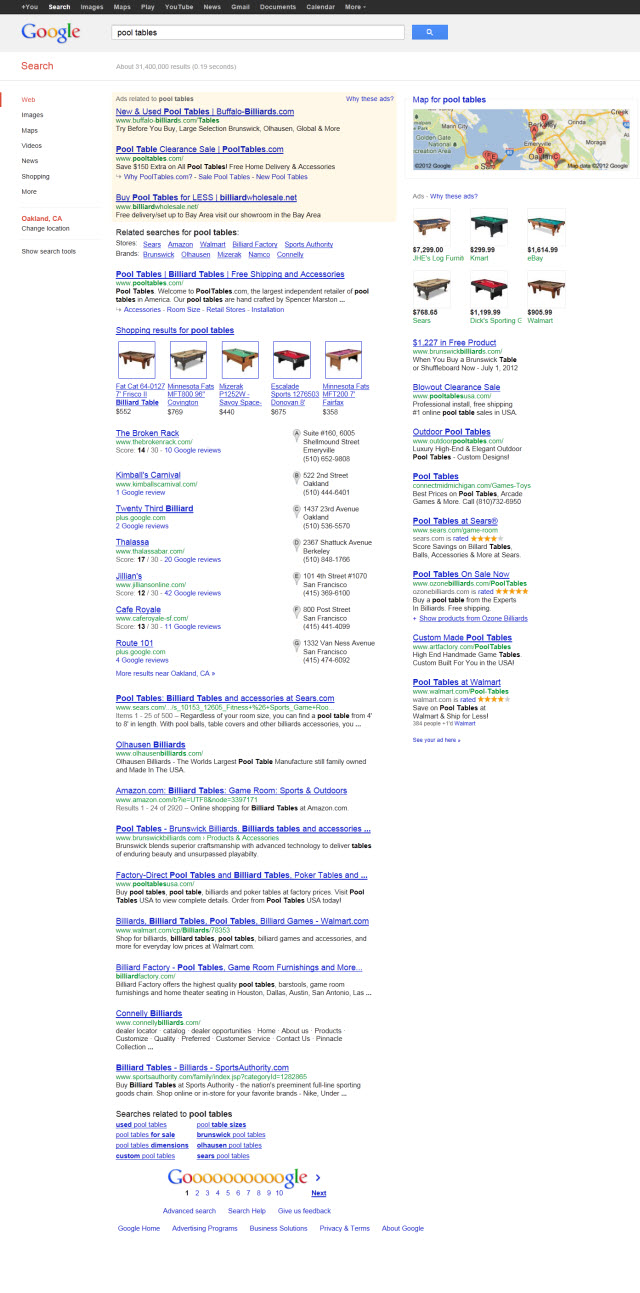
AdWords, product listing ads, brand navigation, product search, local, etc. A result like this has a single organic listing above the fold & if Google decides to rank their local one spot higher then that turns to zero.
If you look at the new TLD announcement Google applied for .MBA & .PhD (as well as many names around entertainment, family & software). Thus it is safe to say that education will eventually be added to local, video, media, shopping & travel as verticals where Google is displacing the organic results with links to more of their fraternal listings. About the only big categories this will leave unscathed will be real estate, employment & healthcare. However those first 2 are still in contraction during our ongoing depression & Google blew a lot of their health credibility by pushing those illegal ads for steroids from a person posing as a Mexican drug lord.
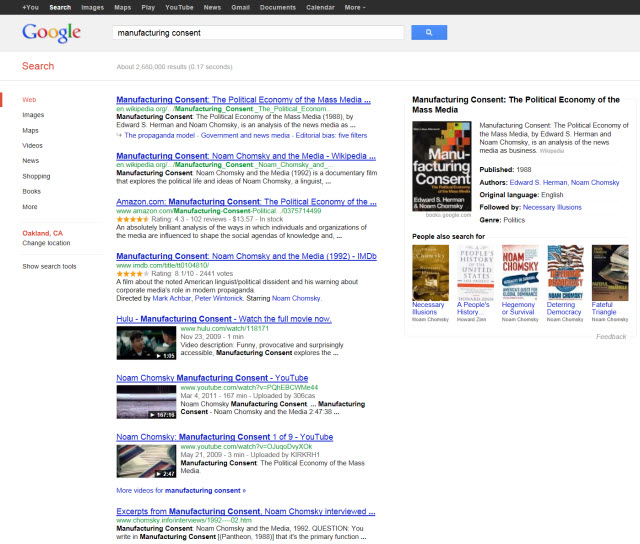
In addition to these fixed vertical that cover the most profitable areas of search, Google is also building a "vertical search on the fly" styled service with their knowledge graph. Their knowledge graph extracts data from 3rd party websites & then can be used to funnel traffic and revenue to Google's various vertical services. To make it seem legit, Google will often start by sending some of the traffic onto 3rd party sites, but the end destination is no different than product search. While it is a "beta" product it is free to justify an inferior product being showcased front & center, but after Google gets enough buy in they monetize.
There is a non-subtle difference between Google's approach and Microsoft's approach to building a search ecosystem.
Sucking the Brains Out of the Internet
After Google was unable to acquire Yelp they offered Yelp (& sites like TripAdvisor) an ultimatum: "either let Google steal your content & displace you with a competing service consisting largely of the stolen content, or block GoogleBot if you don't like it." While Google sucks in the value created by such 3rd party sites, they also explicitly exclude them from various vertical services aligned with the most valuable keywords. Yet at the same time, all this is to be seen as legitimate because there is a computer used somewhere. It as though humans are not making these profitable business decisions at all & so Google hires lawyers to write coin operated legal opinions about how computer generated results are free speech.
Nextag's CEO wrote a scathing article about Google in the WSJ, which promoted a response from Amit Singhal.
If you've wondered why Google keeps appearing before regulators, keeps being called evil, was just sued by the Texas AG, & has their own hate organization the above exemplifies why.
Let's compare that behavior against Yahoo! or Bing.
Yahoo! has long been considered out of the search game, yet when they want to have a competitive advantage they do things like license photos from Getty. They use the content with permission on agreed terms.
Google's approach is more along the lines of "scrape it now & figure out legal later." And after a long enough period has passed they will add monetization & mix it into the core of their offering, like they recently did with books:
This launch transitions the billions of pages of scanned books to a unified serving and scoring infrastructure with web search. This is an efficiency, comprehensiveness and quality change that provides significant savings in CPU usage while improving the quality of search results.
Both Bing & Google are creating knowledge graphs. Bing does things like partner with Britannica, Yelp & Qwiki.
Eric Enge interviewed Stefan Weitz about the new Bing interface. As part of that interview, Stefan described Bing's editorial philosophy on building a search ecosystem
We partner with 3rd party services instead of trying to build or acquire them. There are probably something like a million apps out there today.
I talk to probably two dozen start-ups every week that are doing different cool things on the web. To think that we are ever going to be able to actually beat them, or out-execute them (when they are talking about 12 guys with half a million angel funding building some really interesting apps), it is just not likely.
Ars Technica also has a piece discussing the creation of entity graphs (which is where the "sucking the brains" line came from). A key difference between Bing & Google is that Bing feels they should partner with sources & link out, whereas Google links the results back into more Google searches. What's more, when Google features their own vertical results in many cases links to the data sources are not provided at all & you stay on a fully Google experience, in spite of the cost to 3rd parties in building & maintaining databases that are scraped to power Google's offerings.
Off the start forays into new categories might provide some value to publishers in order to get buy in, but eventually the "first hit free" stuff shifts to paid & Google continues to displace publishers across more and more of the ecosystem, using content scraped from said publishers.
Funding Scraping
When Google or Apple drive cars around the country or fly military-grade planes over cities to create 3D maps of cities they are creating databases & adding new information. Outside of collecting private data (like wifi payload data) there is little to complain about with that. They are adding value to the system.
However, at the same time, Google not only scrapes themselves, but they are a revenue engine that drives a lot of third party scraping. And they design penalties in a way that allows those who scrape penalized sites to outrank them. With batch penalty updates some folks can chain redirects, expired domains & so on to keep exploiting the combination of copyright violations & Google penalties to make a mint. Google also had a long history of funding Traffic Equalizer sites, sites like Mahalo that would take a copy of a search result & auto-generate a page on it, newspaper sites that would hang auto-generated stub preview articles on subdomains, & sites like eHow which integrate humans into the process.
While many sites are still penalized from the first version of Panda, downstream referrals to eHow.com from Google in the US were up over 9% last month. They know "how to create SEO content."

Recently a start up that launched a couple years ago decided to take their thousands of subdomains of scraped databases & partner with authoritative websites to syndicate that content around the web. Some of those get double listings & for some search queries there is the same page (with a different masthead logo) 5 different times. Those sites don't get hit by duplicate content filters or algorithms like Panda because they have enough domain authority that they get a free pass. Including AdSense in the set up probably makes it more palatable to Google as well.
If you have scale you can even auto-generate a bunch of "editorial" questions off the database.

More data = more pages = more questions and comparisons = more pages = SEO alchemy (especially if you don't have to worry about Panda).
The parent scraper site includes links back to itself on every syndicated page, which to some degree makes it a glorified PageRank funnel. WPMU.org got smoked for syndicating out a sponsored theme on one of his own sites, but the above industrial-scale set up is somehow reasonable because it was launched by a person who sold their first start up to Google (and will likely sell this start up to Google too). The site also includes undisclosed affiliate links & hands out "awards" badges to the best casual encounter sex dating sites, which then get syndicated around the web & get it many inbound links from "high quality" porn sites.
I won't name the site here for obvious reasons, but they are not doing the above in a cloak of darkness that one has to look hard to find & do deep research to patch together. For some search results they are half or more of the search result set & they even put out press releases when they add new syndication partners, linking to numerous new automated subdomains or sections within sites related to various categories.

When the search results look like that, if you do original in-depth reviews that are expensive there is zero incentive structure to leaving your content and ratings open to Google and these sort of scraper/syndicaters.
There is always a new spin on the mash up low end content with high trust websites and try to feed it into Google. So long as Google biases their algorithms toward big brands & looks the other way when they exploit the ecosystem that trend will not end.
The Illusion of Choice
It is hard to see & feel the cost of a dominant market participant unless you have to do business negotiations with them:
The Independent Publishers Group, a principal distributor of about 500 small publishers, recently angered Amazon by refusing to accept the company’s peremptory demand for deeper discounts. Amazon promptly yanked nearly 5,000 digital titles. Small-press publishers were beside themselves. Bryce Milligan of Wings Press, based in Texas, spoke for most when, in a blistering broadside, he lambasted Amazon, complaining that its actions caused his sales to drop by 40 percent.
However, even when companies are brutal in some aspects they do amazing things in other areas, so one has to weigh the good with the bad.
Now more than ever we are drowning in perceived choice, but if you look at market after market they are far more consolidated on the business side.
Into hipster indie music? Those labels are heavily reliant on the bigs. The increased flow of online streaming royalties will further increase the consolidation as big businesses prefer to negotiate with other big businesses & small players lack the resources needed to move the needle.
At any point Google can fold one vertical into another or extend out a new model. The Android Marketplace feeds into Google Play, Google local feeds into Google+, Google search force feeds just about everything else & even free offerings on sites like YouTube will eventually become pay to play stores.
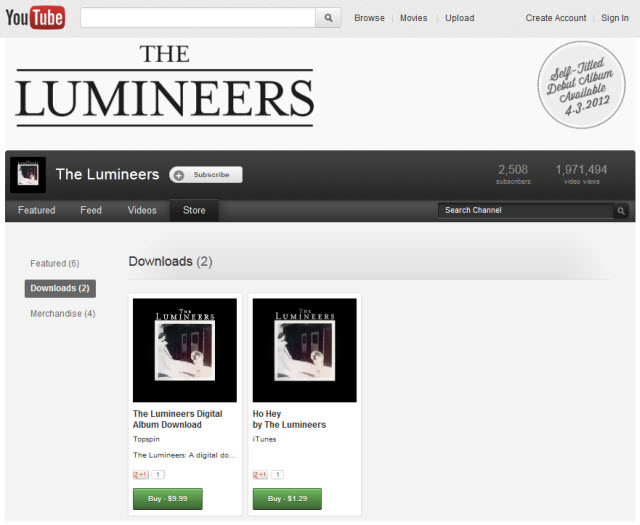
Where Google lacks marketshare & forced bundling isn't enough to compete they can buy the #2 or #3 player in the market & try to propel it to #1 using all those other forms of bundling.
Part of what made search competitive against other platforms was its openness & neutrality. But if the search results are Wal-Mart over and over again (or the same scraped info 5 times in a row, or a collection of internal listings) then the system becomes more closed off & the perception of choice becomes an illusion. John Andrews wrote a couple great Tweets expressing the shift in search:
- "Google SEO is no longer worth the effort for those who are not writers, artists, speakers, trainers, or promoters. What happened to Search?"
- "If you want to see what Google will look like after it locks up, look at Apple. ipad users are already "managed" very tightly."
When companies try to expand the depth of their platform with more features it is a double edged sword. At some point they capture more value than they create and are no longer worth the effort. When they get to that stage it becomes a race to the bottom with scrapers trying to outscrape one another. Then in turn the company that created the ecosystem problem uses the pollution they rewarded to further justify closing off the system, guaranteeing only more of the same. Those who actually add value move on looking for greener pastures.
Protecting Privacy
Google promotes that they make browsing safe & Firefox will soon stop passing referrer data. Apple was granted an anti-Big Brother patent. StopBadware partnered with Google, Facebook & others to create a self policing industry organization named the Ads Integrity Alliance.
When these companies are not busy "protecting" users they acquire recognition technology, collect a treasure trove of personal data, deliver fake endorsements, provide false testimonials & sell off the data to third parties.
Microsoft filed a patent for serving mood-based ads & there is research on how depressed people use the internet.
These companies compete on both the hardware & software level, collecting more data & creating more ad formats.
A label or an interest is a vector for ad targeting. There is no need to worry about de-anonymizing data for ad targeting when it is all in-network and you monitor what someone does, control which messages they see, & track which ones they respond to. Tell someone something often enough and they may believe it is true.
The Contempt Large Companies Have for their Customers
There is a sameness to customer service from a lot of big companies. They spend loads & loads to track you and market to you, but then disappear the moment things go wrong, as they are forbidden to care.
Perhaps the only thing worse that AOL's customer support is the unmoderated comments on the YouTube page.
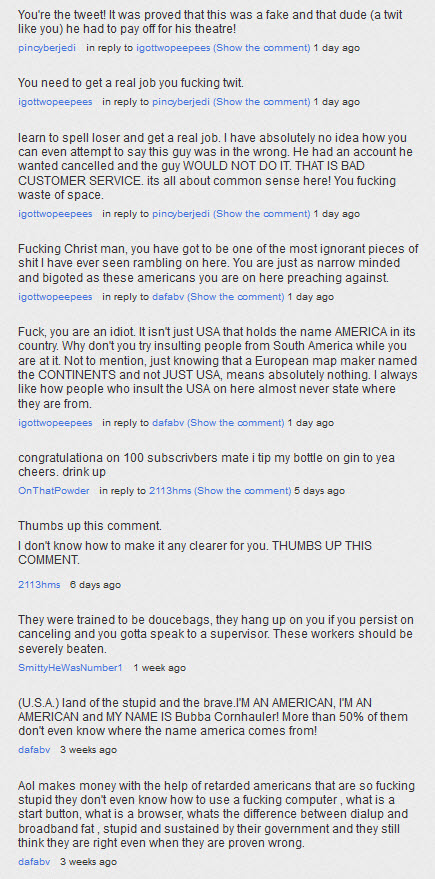
Google will rate YOUR customer service, but when it comes to customer service FROM them you are on your own:
Denise Griffin, the person in charge of Google’s small customer-support team, asked Page for a larger staff. Instead, he told her that the whole idea of customer support was ridiculous. Rather than assuming the unscalable task of answering users one by one, Page said, Google should enable users to answer one another’s questions.
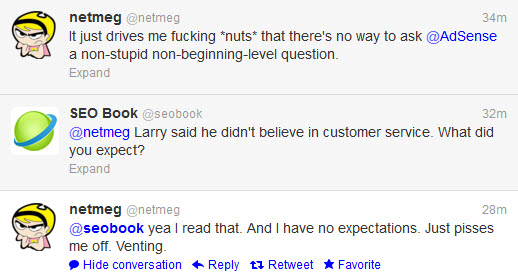
Even their official blog posts announcing that they are accepting customer feedback for your applications go unmoderated.
This sort of contempt exists at essentially all large companies.
Everything seems on the up & up, but that "private listing" was maybe for a counterfeit product.

If it isn't a counterfeit & you get too good of a price you are threatened with a lawsuit, and the branded network falls behind a "oh we are just a marketplace and can't be bothered to give a crap about our customers" public relations angle.
If a company has size there is a limit to how much they can invest in any individual transaction. And so ebooks made of YouTube comments invade Amazon.com.
Apple creates "beautiful" products designed around forced obsolescence:
The Retina MacBook is the least repairable laptop we’ve ever taken apart: unlike the previous model, the display is fused to the glass—meaning replacing the LCD requires buying an expensive display assembly. The RAM is now soldered to the logic board—making future memory upgrades impossible. And the battery is glued to the case—requiring customers to mail their laptop to Apple every so often for a $200 replacement. The design may well be comprised of “highly recyclable aluminum and glass”—but my friends in the electronics recycling industry tell me they have no way of recycling aluminum that has glass glued to it like Apple did with both this machine and the recent iPad. The design pattern has serious consequences not only for consumers and the environment, but also for the tech industry as a whole.
...
Every time we buy a locked down product containing a non-replaceable battery with a finite cycle count, we’re voicing our opinion on how long our things should last. But is it an informed decision? When you buy something, how often do you really step back and ask how long it should last? If we want long-lasting products that retain their value, we have to support products that do so.
One last bit of absurdity on the YouTube front. Google recently threatened to sue a site designed to convert YouTube videos into MP3s.
- How does Google's "computers deserve free speech rights" & shagging 3rd party content to fill out their own vertical search services compare against their approach when someone uses YouTube content in a way Google does not desire?
- There are AdWords ads promoting free unlimited MP3 downloading & song burning bundled with shady adware.
- Google's AdSense for domains funds boatloads of cybersquatting. While Google threatened to sue this particular site, they could have just took the domain due to it cybersquatting on the YouTube trademark. The fact that they chose to turn this into a press event rather than simply fix the issue shows that this is more for posturing.
- Further aligned with the above point, while Google singled out a specific MP3 conversion site, there are other sites designed around doing the same exact thing which are PREMIUM ADSENSE PARTNERS, with the body of the page looking like this:
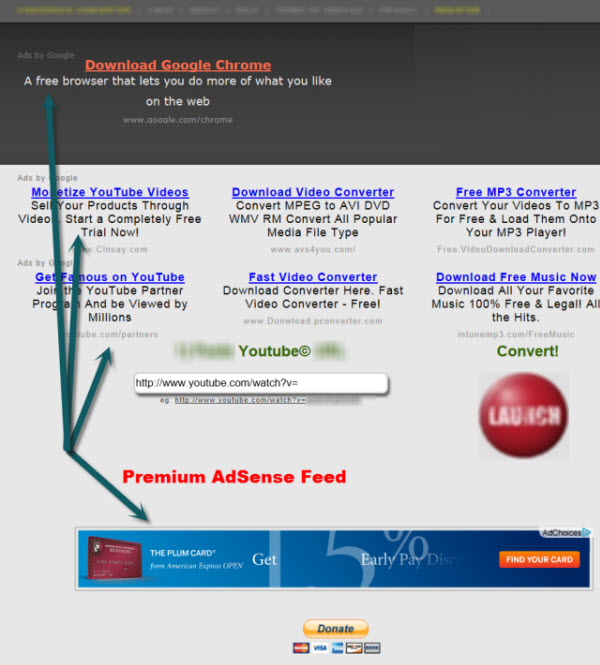
How Small Companies Are Taxed With Uncertainty
When Google decided to move away from direct marketing to brand advertising things that are often associated with size, scale & brand recognition became relevancy signals.

For big brands there is no shortage of companies trying to service the market that Google is favoring. For smaller companies it's a struggle. There are so many things to know:
- how to create & pitch feature content
- what do unnatural link warnings mean & how do I interpret reinclusion request replies?
- how much to invest in marketing, where to invest it, how to balance the need for short term cashflow with the required reinvestments to build real (or fake) brand signals
- how long does the market have left before Google enters the niche and destroys the opportunity that organic SEO once represented
- should you run 1 website, or many to hedge risks? and how many is optimal?
- how big should your site be?
- if one of your sites gets penalized, should you try to fix it up, should you start over with a new site, or should you consider SEO to be a pointless goal?
Google mentions that they want people to do what is best for the user & not worry about Google, but that advice is a recipe for pain
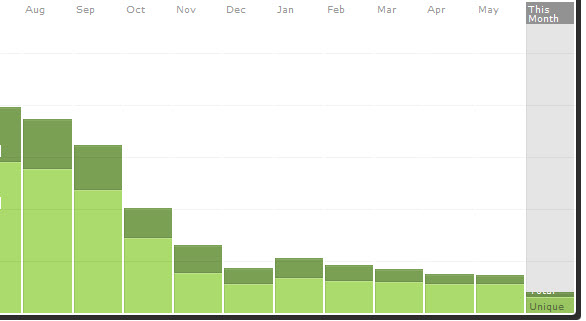
If you do not run a large & authoritative website there are so many landmines to trip over with the increasing complexity of SEO. And any of Google's "helpful" webmaster messages can suspend a webmaster in fear, leading them to an eventual bankruptcy.
Small companies need to do all sorts of canonicalization hoops & prune content and such to hope to avoid algorithms like Panda. Then Google changed their host crowding preferences to let some large sites get up to 8 listings in a single search result page for their LACK OF effort. Those larger sites can then partner with glorified scraper sites that syndicate databases feeding on domain authority with no risk of Panda.
Due to how Google penalizes smaller sites, those that rewrite their content will outrank them when they get hit. These horrible trends are so obvious that even non-SEOs like Tim Carter (who was a Google golden boy for years) highlights how the tables have tilted away from what is most relevant to what pays Google the most.
The promise of the web (especially search) was that it could directly connect supply and demand. However, just like propaganda promoting the superiority of certain countries in the physical world, it is unfortunately fast becoming a myth.




Comments
Hey Aaron. I'm surprised that more folks haven't chimed in on this post. I think that you highlight some very obviously shady business tactics that Google engages in (though I'm not quite sure that many of them qualify as unethical in any sense). Google, like most mega-corporations, serves many masters and engages in a lot of behavior that is far from altruistic.
However, when it comes to their approach to paid inclusion, I think that your hypothesis might not hold up to rigorous scientific inquiry. A couple of things worth noting are:
1) for many e-commerce/retail product queries the "little guy" (non-enterprise) is typically selling the same exact product the big guys are selling. In fact, the big guys like Amazon.com (and Walmart, who few realize is adopting Amazon.com's marketplace model) often end up selling the little guy's stuff. Commoditization is a big part of retail (e.g. a bunch of players, big and small, selling the same thing) and for those types of queries, creating a tightly controlled, paid-inclusion experience actually improves search results because it removes some of the fly-by-nights that are selling the same stuff but with vastly poorer customer service or quality control processes.
2) Like you, I don't have access to all of the data (which is a crucial prerequisite when attempting to falsify a hypothesis) but what I can tell you is that I do have the data on nearly a half-dozen very small e-commerce companies that all get massive amounts of natural search traffic for highly lucrative terms across a wide variety of verticals. In fact, the scales are so tipped in their favor that I can't even convince them (as a friend and confidant) to invest in product listing ads (PLAs) or even paid search in some cases!
Your article, as usual, is making me think a lot, and for that I am grateful. However, one thing that comes to mind is if you've ever thought that perhaps your viewpoint on these matters is less than objective, and if so, if you've ever considered looking into data points that would falsify your current hypothesis.
3) I know of a tiny cabinet maker that sells his cabinets online in addition to locally. He gets massive swaths of natural search traffic despite the fact that his results are almost always below the fold due to not only paid ads but also local search results since Google considers "cabinet" related searches local by default in most cases.
So for example, have you ever considered gathering screen shots of e-commerce search results that have plenty of natural results above the folder? Or perhaps gathering data on small players to find out if they do or don't capture their fair share of natural search for highly lucrative e-commerce terms?
I'm glad that you're committed to shedding light on the shadier business practices of Google, other conglomerates, and even governments. But as you likely know, I sometimes wonder if you fail to apply scientific rigor or even basic skepticism to your hypotheses.
After all, there's no such thing as absolute certainty.
Generally sure, but your protection from a scammer selling into a larger marketplace isn't any greater than buying directly from a scammer. If you use a credit card you can reverse the charge either way.
What's missing is *diversity* ... I mean yes some stuff does get ported over to eBay and Amazon.com & such, but if you want old collectibles there are sites that have them that can't be found already. And when it goes pay to play only they certainly won't be found. Likewise with those selling rather unique items. I search for "gold rings" and Google shows me some terrible $22 ring from Nordstrom. That might be great for the average user, but it is an awful experience for me. I bet many Google engineers would get put in a choke hold by their wives if they bought them such a ring. :D
Even worse if the vendors in AdWords are also the top organic results AND in paid inclusion. You get the same trash served to you 3 different ways.
The only aggregate data that is really needed is the growth rate of paid clicks & screenshots of the search results. Everything else is a side current following the above general trend.
Can someone say my analysis is flawed or not objective? Certainly that can be claimed, but there is no way to honestly claim that it is more self-interested & less objective than what Google has done over the past year. I mean even their own internal docs in the Rosetta Stone case showed they knew AdWords created consumer confusion & I *did* survey users about a half-dozen different ways about paid search ads & users were generally pretty clueless. Further, even Google's early research stated that they felt ad-based search business models were bad.
And there are thousands of folks with the other side of that story. The big issue is it seems abstract or like nonsense until it is oneself in the guillotine. And by the time it happens it is likely already too late.
Certainly there are coverage gaps in any vertical. But the trend is that they get filled over time. I follow the leading edge of trends, because that is where things are headed. I don't have much concern for the things that have not yet changed, because over time more and more of those change. Google does things with levels of confidence, so bigger & deeper markets (in terms of ecommerce and local) will be impacted first. But it doesn't mean that I should focus on smaller towns as a contrary opportunity, because many of those are so tiny that they are not opportunities AND over time as the models are refined many of them will be shifted over too.
If I want to find out the general direct of hotel search results I search for stuff like "New York Hotel" rather than "Forrest, IL Motel." Also note in that new york hotel search result I just linked to that they also added entity graph for that word, so they are now even graphing some generic keywords. If you click into that you stay on the search page & if you click on those various options that brings you to more search results & so on. It is becoming harder to leave Google.com without clicking an ad. And that is well reflected in their quarterly numbers, quarter after quarter.
Another way of stating the above is that when revenue is a driver of decisions the biggest and deepest markets get fed first. If Google has trouble getting *anybody* to buy the keyword "credit cards" in the Philippines & there are only 2 hotels in a town of 1,000 people (where a hotel stay costs $23 a night) Google can't skim as much off that market as it can from getting a cut of 90,000 people staying in New York City for a couple hundred Dollars a night each.
You make some valid points, Aaron. I have some additional thoughts on the matter (actually a whole bunch of them) because this is one of my favorite topics (paid vs. natural inclusion) but I'll leave you with this:
Next time you want to find a really unique gold ring for your wife skip Google and Amazon and hit up Pinterest. But do it quick because the big retailers are flooding that new revenue stream too (it's amazing to see how much revenue that network can generate for retailers).
That or, like you and most other people on the upper edge of the bell curve, do the extra legwork to find those niche folks that have the really good unique stuff. Google and Amazon should only be a starting point. The internet is a big place.
That's how I found some sweet Lightnin' Hopkins cover art for my office walls:
http://www.wolfgangsvault.com/lightnin-hopkins/photography/fine-art-prin...
Cheers!
...tends to drive a lot of our purchases. :)
Haven't used Pinterest too much (partly in fear of creating another YouTube / Nintendo 3Ds time sink). :D
Anniversary comes up here soon though...so do need to do some shopping soon.
That's funny! Same reason why I have an account but don't ever use it. Enjoy the anniversary!
Fact of the matter is that we, SEO's are losing a battle that is ever changing. We have monetized our services ongoign for some time as we have evolved as Google has however, there is a very distinct motive that you ahve pointed out time and time again: revenue. It's really not about the user experience anymore. I believe that their attempts to benefit the user experience are masked with PR and political "run-around" answers. The best thing we, or any business owner can do is to subscribe to the changes and obide by them, or soak a shit-load of money into AdWords. I am beginging to feel, which is what they want me to do is to focus more on CPA of an AdWrords program. If I am spending enough then at leat I'll have some recourse with a rep, or conversation of someone following internal Q & A procedures to ease my thoughts of getting fucked.
I fail to see how the new layout is any better than Adsense pages. All the real content is below the fold in that case. What is happening to Google? I'm glad you bring a hard dose of reality. It seems too many SEO's are too rosy in the cheeks about these updates. I own small businesses and these updates are hideous and I can't imagine what it must be like for people with far less SEO experience than me.
The spammy network of churned content is FindTheBest, for those who didn't recognize them. I find it very frustrating that Google called them --the next big thing in search-- and indexes just about everything they do. I initially believed FTB was a skunk farm or a front for how Google wants to spam the web going forward, keeping everyone on Google peoperties that re-represent everyone's scraped content. I still do.
If Google did what FTB is doing, they'd get heat. But if "someone else" does it (like a former Googler), Google can highlight it as awesome, rank it for everything, learn from it, and never take responsibility (until they buy it). Cowards. And the FTB people can play around with no fear of actually having to survive in the search marketplace.
To all who say SEO's are dying or going out of business or whatever, check yourselves.
Back in 1995 "SEO" was completely different than it was 2 years later. An actual Search Engine had been invented... and Google copied it and modern search took off. Prior to that "search" was merely what we call directory indexing today. The SEO people survived.
Back in 2003 search changed again... and the SEO people survived. In 2007, 2008, and virtually all of 2011, search was redefined. Now we see Google closing up...which will change search engine. I think good SEO people will survive.
"This sort of contempt exists at essentially all large companies."
I believe that in this respect you, uncharacteristically, are taking the heat off Google.
In my experience, most large companies (I'm a small entrepreneur, never having worked at any of those) do aim to provide a decent customer service characterized by
- dedicated teams properly staffed
- 0-24 availability
- the possibility of personal interactions
- procedures put in place that ensure your specific problem will be dealt with somewhere down the line
Google is egregiously lousy in terms of customer service, and from the Wired article you linked, now I understand why. I especially love the "It worked, and thereafter Griffin cited it as evidence of Page’s instinctive brilliance" part, coming from the gushing employee.
Yeah, this genius plan to get rid of customer service chores really works.
It only depends whether you judge it by the experience of those partners and customers who have to struggle with the crap Google provides as "help", or rather by the company's financial results, further enhanced thanks to yet another responsibility Google could "brilliantly solve" not to care about.
For this is a core element of the company's modus operandi: finding brilliant ways to ensure a progressively decreasing burden of responsibility. A lot of what you rail against in this blog can be explained as a symptom of a company striving for ultimate non-responsibility.
More and more it seems, Google's corporate culture is very much a mirror image of the (not so) slightly psychopathic personality of its founders. If you look beyond the over-emphasized public image of playfulness and do-goodness, one would be hard-pressed to find any other company so fundamentally un-human below the surface as Google. Their only gods are scalability and power.
... I think I was speaking more from the perspective of monopolies, oligopolies & new age tech start ups.
I didn't write this piece (wish I did), but it really captures the raison d'être at many of these tech companies:
Great comment Headway. Anyone who's ever had a technical problem with Google knows how bad they are at customer service. From Google Products to Webmasters, the best you get are canned responses that are often irrelevant to the technical query.
hugoguzman, what does that tell you about Google then? Google are meant to be THE portal to the internet - where you can unearth the most obscure product or opinion or service. That's their USP - to give you relevant results from their uniquely deep index of the web. If Google just want to be a decent commodity-search tool, then why wouldn't anyone just disintermediate Google altogether and browse eBay or Amazon for commodity products? If Google do court the bigger brands simply by pricing out smaller companies, they may find themselves becoming ever more irrelevant to many searchers who are like Aaron and want to find non-commodity products. And what of services? By their very nature, services are largely "non-commodity" - they're dependent on each individual company and their skillsets. If big service companies can out-spend smaller ones, is that a "win" for the Google searcher looking for a quality service regardless of the size of the service provider? No.
Furthermore, if Google do start streamlining their results to paid inclusion / knocking organic listings further down, and we end up constantly getting the same brands appearing, it's not hard for a competitor to produce the same results. If the top 10,000 brands or whatever become 90% of your results, then the cost to index (and keep fresh) 90% of your SERPs is a lot easier to do (for competitors). Google lose their hard-to-copy USP (deep index).
I can't help but think Google are boxing themselves into a corner here, and they perhaps even know it - but they just can't stop because they only have one main revenue stream - ads.
What's Andrew. It tells me a lot. Probably what it speaks to the most is that Google is far from the overwhelming monopoly most people think it is.
It's by far the second option for e-commerce discovery, trailing far behind Amazon. Mind you, Amazon is 100% paid inclusion channel. It's just they take their cut when something sells as opposed to when someone clicks.
So my question to you is, where's
My son jumped on my lap and killed the end of my comment. Doh!
My question is, where's all the vitriol and distrust for Amazon?
I have to ask Hugo, are you being paid by Google lately? Or perhaps a good srategy for Big Brand in-house SEOs is to kiss up to Google in public?
It's pretty obvious on the surface that public praise of Google (the way they like it) helps SEOs who need help. It's also pretty clear that criticisms of Google can hurt SEOs these days.
Since you continue to move conversations (e.g. here and on your blog) towards "Google's not so bad.. look at who else is bad but isn't getting criticised" and "big brands are actually at a disadvantage to small players" I wonder if you're being genuine, or chasing the money? Or politics?
Last time I hinted at my view you suggested maybe I was getting personal, or had a beef. Let's get that out of the way. I'm just interested in knowing if you have an agenda, because it seems so.
...in fact, you will see in the above post that I cited an article attacking Amazon. I also cited one about how an eBay auction that was "won" at a low price led to a lawsuit threat when the seller decided the price was too low after the "no reserve auction" was complete. And then there is the disaster of buyer protection that means sellers get scammed, scammed, scammed. Want to hear about $20,000 in fake orders out of Vietnam trying to get affiliate commissions (or perhaps a valuable antique that was smashed for falsely being reported as a fake)?
If I were a book publisher (rather than a website publisher) then I would often highlight some of the behaviors players like Amazon & Apple have done to lock down and control their distribution channels. In fact, I follow those anyhow & write about them in our newsletters & so on, largely because many of these companies are following the same playbook, with the only differences being cosmetic branding differences & market entry point.
Where search *was* (past tense) difference was starting from the point of openness & building off that as a point of differentiation. Notice in the above how I quote John Andrews on how Google is moving toward a closed ecosystem & becoming more like Apple. That trend has been building up for years now. In fact, just after Panda happened I started a blog posted title "from open to closed: why Panda is such a big deal" ... I have been collecting reference links & wanting to write it for over a year now, but the reality is that topic might be too broad. A blog post like the one above can take ten hours or more. One about the broad shift from open to closed might take closer to 30 to 50 hours.
To claim that Google is not a monopoly is laughable. They have monopoly marketshare in numerous markets:
In different contexts & legal jurisdictions the precise definition of a monopoly can change. In some areas it might even be as low as a quarter of the market, where in other areas it might be a majority, over 60%, over 75%, over 90%, etc. ... but Google is above any of those numbers in some markets. So no matter what definition you chose Google is still a monopoly. :D
Sidebar: Calouste Gulbenkian liked to have a 5% stake in the shares of oil companies. Likewise Yasuo Hamanaka liked to have 5% control of the copper market to manipulate the price. Both of these guys (in different eras) earned the nickname "mr. five percent."
Yasuo Hamanaka was jailed for his efforts in cornering the copper market & that also led to changes in regulating commodity trading. If you think about Google's massive (90%+ in many markets) share of search (& distributed ad network across the web), their editorial policies can easily manipulate markets far more than Mr. Hamanaka did.
Well my point was that Google are losing their USP of being the only place to dig out the more the obscure products and vendors online. That has nothing to do with whether Google are a monopoly or not. Though if they do continue to narrow down their results (due to pricing out smaller businesses), then they may just become an also-ran for product discovery in the future.
That's an interesting claim - do you have any data to show Google are far behind Amazon when it comes to volume of e-commerce searches?
...worked for a *huge* ecommerce play & mentioned that they saw quite a big shift over the past few years AWAY FROM direct navigation over to branded searches. If you leave the ".com" extension off of your search then Google still gets to clip searches for Amazon for a few cents each with an AdWords ad front & center.
http://www.bloomberg.com/news/2010-10-21/google-2-4-rate-shows-how-60-bi...
It's getting like they don't care about search anymore, just money. As Terry Kyle put it "There's no way that Google's SERPs would pass their own Google Human Review guidelines on some/many search terms now."
Something to the effect of:
3rd Page Google- Support Small Business
...just use Bing. ;)
The biggest problem with the 3rd page idea is that it is still promoting Google. The second biggest problem is that for many searches Google will show the same site 6 to 8 times on page 3 of the SERPs that they show on page 1 of the SERPs. Thus page 3 might not be getting you past the corporate media empires & big brands that dominate page 1.
Right off the bat you spoke about "Notice Google tells us "paid relationships improve quality" and then penalizes for paid links?" The problem I see is that google is getting so far removed from giving their customers (Those who use the search engine) what they really want "Truly relevant search results" and instead are now so concentrated on ad revenue that the combination of giving advertisers what they want and the customer true relevant search results has now become hazed at best. Or perhaps I am just too cynical to the reality?
...that was a big part of the point of the last couple blog posts. As Google displaces the organic results (& generally makes SEO both less reliable and less valuable) they also decrease the incentive to invest in their ecosystem, which in turn gives searchers a worse user experience.
Google needs to decide if they want ads everywhere & to extract all the value. But if that is what they want then they can expect some smart publishers to move behind walled gardens & the quality of their search index to decrease.
Hey Guys (and Gals) I am new to posting on here, but have been a long time reader.
I have noticed a shift in how the Google shopping results are showing up. It seems like about 80-90 percent of my searches put the Google shopping results in upper right hand corner of the screen. It seems like this is actually increasing the CTR for our organic results. In the past it used to place the old Google shopping in line with the organic results 100 percent of the time. Is anyone else noticing this?
... in terms of
In the past they had mentioned that the graphic ads in the right rail get double the CTR as the regular AdWords ads in the same spot. Where they have lower confidence they might be leaning more on the right rail & then as they begin to better "structure" the category they can move it over to the left column. Searching for "tent" can show you one attempt at structuring. Presumably the same thing could be done with other categories like shoes and so on.
CTR for organic results when the shopping results that were inline have now been replaced with ads showing in the right rail? If you were #2 in the past for commercial terms, google would place the shopping results inline above you. This would include a picture and 3 links most times. Being #2 was more like being #5. Our rankings haven't really improved since this testing has been going on, but a lot of our keywords that were #2-5 are getting a lot more clicks. I just can't figure out why other than the CTR increasing because of the lack of shopping results. Nothing else has really changed. Maybe I'm over thinking this.
...but the issue is that as the holiday shopping season starts you can bet that Google will place their shopping ads in more aggressive placements and/or extend AdWords in other formats.
The search results are almost like a beachhead where the ads are killing (or at least pushing back) the organic results. Once any real estate is occupied by ads, it rarely shifts back to being organic for any extended period of time.
Analogies about boiling a frog come to mind.
Add new comment